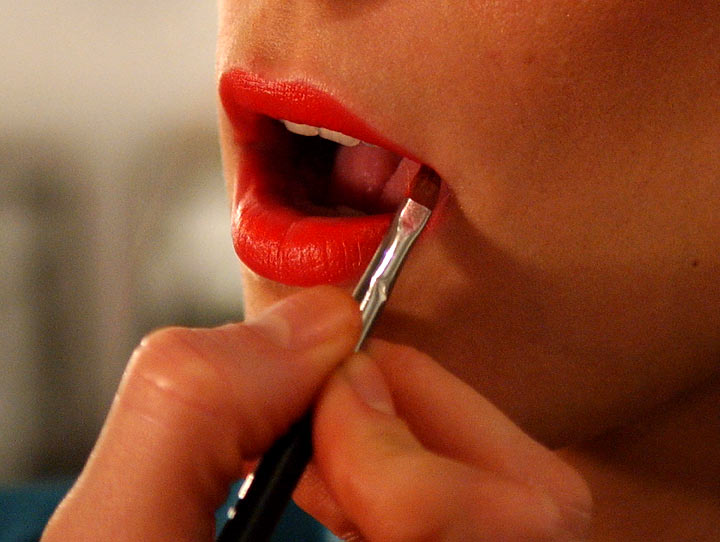A recent study shows we have a bit of a problem when it comes to old makeup – we’re hoarders.

- 89 per cent of women hang on to old makeup “just in case they might need it later” even though 87 per cent of know makeup has expiration dates
- 92 per cent of women whose old makeup causes them to break out still feel guilty about throwing it away.
That might be because of how expensive some makeup can be.
“Clearly there’s a correlation in the consumer’s mind between what they spent and how long something should last, or how long they should hold on to it,” said Bryan Barron, research director at BeautyMythBusters.com and co-author of The Best Skin of Your Life Starts Here.
“For special occasion makeup, something that you know you’re only going to use once or twice a year – don’t spend a lot of money.
“You don’t need to spend a lot of money on makeup products, period.”
The most common makeup to stick around too long? Eye makeup, which actually expires the fastest.
WATCH: Although there is no expiry date in containers, lifestyle blogger Lisa Kisber says there is a ‘best before’ policy you must follow.
Eye makeup
Opthamologists usually recommend that you throw out your mascara after three months. Barron thinks you can stretch that to six months, but by month four it may not apply as nicely.
“You may notice mascara’s starting to clump and flake. It becomes crumbly.”
He explained that mascara dries out easily because every time you take the wand out you’re pushing air back in.
Powdered eye shadows can last two to three years, according to Barron.
As for cream eye shadows, the biggest sign those have gone bad is an odour change. Barron said when it starts to smell like an old candle, it might be time to toss it.
“It probably wouldn’t go on as smoothly, it may start to clump and it probably won’t last as long.”
What not to do: Don’t add water to your mascara to try and make it last longer. The water may not be as clean as you think it is and might just introduce bacteria, which thrives easier in water-based products.
Lipsticks
- Gas prices surge in some parts of Canada. What’s causing pain at the pumps?
- Roll Up To Win? Tim Hortons says $55K boat win email was ‘human error’
- Ontario premier calls cost of gas ‘absolutely disgusting,’ raises price-gouging concerns
- Netflix beats subscriber targets, but revenue falls short of forecast
Even though lipsticks don’t have water in them, they easily pick up bacteria from your mouth.
Aside from a bad smell, watch out for greyish-white streaks on your lipstick.
What not to do: Don’t keep them past a year or two.
Foundation
If you’re going to splurge on any piece of makeup, Barron suggests this is one product to do it on.
“Foundation sets the stage for everything else that follows, it’s your canvas.”
He points out it’s also easier to try on shades and get properly matched at a department store, rather than just eyeballing it at the drugstore.
Powdered foundations can last two to three years. But you may start to see what Barron describes as a “powder callous.” The build-up is caused by what is essentially a contamination of oils from our skin.
“To keep them performing their best, when you see that build-up happening and the powdered product is becoming more difficult to pick up on your brush…or whatever tool you use…take a clean tissue and light rub it back and forth. So you are essentially taking a couple layers off that powder, almost like you’re exfoliating it. And then you’re revealing the newer, fresher powder underneath that doesn’t have that oil build-up.”
What not to do: Don’t use liquid foundations (and other liquid-based makeups, like primer) past a year. Water-based products are more conducive to bacteria.
Makeup brushes
This is the other piece in your makeup kit that Barron believes is worth splurging on.
Routinely clean applicators.
“For all the hygiene issues in the world of cosmetics, it always surprises me – women think about this being impure or that not being clean enough and they never think to clean their brush or sponge or powder off,” Barron said.
“It just gets gross.”
If you use your brushes daily, you should clean them at least once a month.
What not to do: Don’t buy special brush cleaner. Regular soap or shampoo (ideally without conditioning ingredients) will work just fine.
WATCH: Winnipeg beauty blogger Shayna Wiwierski showcases 4 products we can use to create new uses for makeup we already have at home.
Last but not least, if you store your makeup in your washroom, you might want to rethink that. Or at least make sure you shower with the fan on. Humidity and wide swings in temperature can be bad for makeup, according to Barron.
And avoid jar packaging for water-based creams and skincare products, he added, especially anti-aging ones.
“It’s not only because of the hygiene risk, but also because if you are spending good money on a moisturizer that contains a mix of anti-aging ingredients, the majority of those ingredients are sensitive to routine exposure to light and air.
“So what happens, every time you take the lid off that jar, you’re exposing those beneficial ingredients to the two substances that we know are going to break them down over time.”


Comments